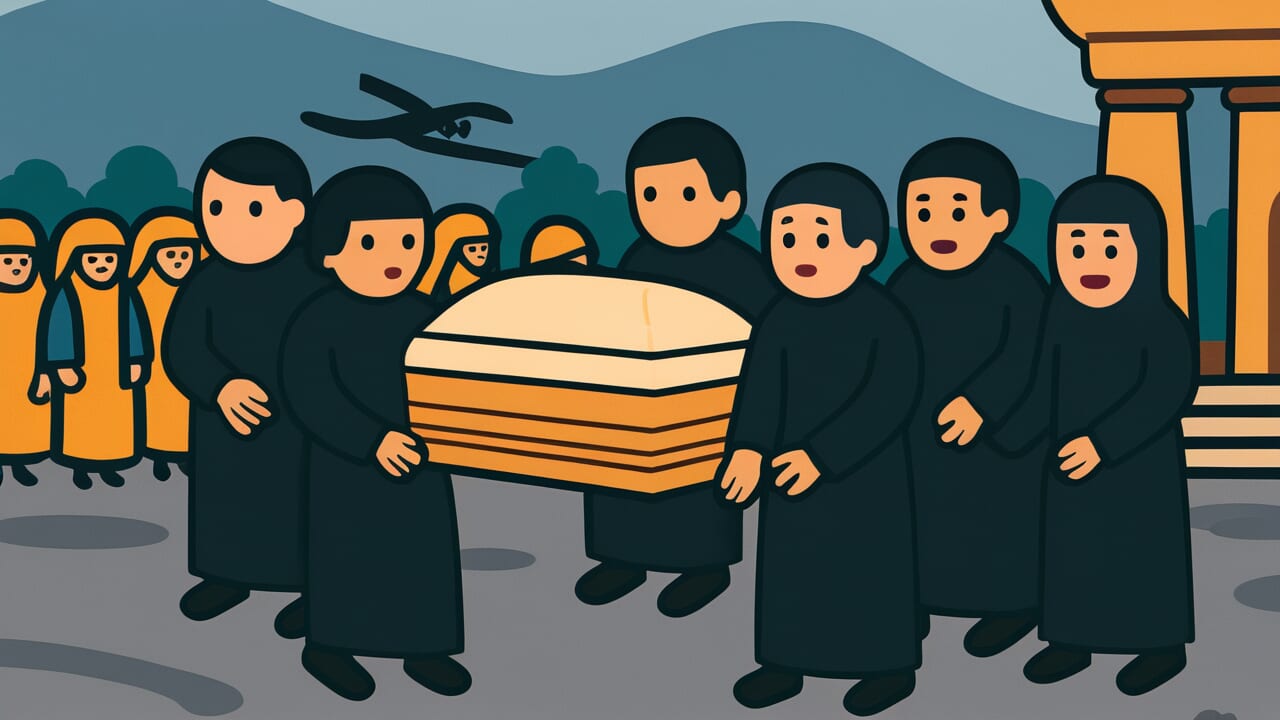How to Read “Even temples have funerals”
てらにもそうしき
Meaning of “Even temples have funerals”
“Even temples have funerals” is a proverb that expresses how sadness and death visit every place. Even in temples, which are sacred places, funerals are held when monks pass away.
This means that no matter how special a place is, no matter how noble a person is, no one can escape death and misfortune. These are unavoidable parts of life.
People use this proverb when someone faces misfortune or unexpected sadness. It expresses life’s impermanence in situations that surprise us.
For example, when something bad happens to a very respectable person, or when tragedy strikes a seemingly blessed family.
Even today, this saying quietly teaches us a reality. Successful people suddenly face hardship. Happy-looking families experience tragedy. Trials come to everyone’s life, regardless of how things appear on the surface.
Origin and Etymology
No clear written records explain the origin of this proverb. However, we can make interesting observations from how the phrase is constructed.
Since Buddhism took root in Japan, temples have been spiritual refuges for people. They are places where monks practice to seek enlightenment.
Monks are seen as people who leave worldly desires behind. They aim to reach a state beyond life and death. Yet even in such sacred places, funerals are held. This contrast reveals the essence of the proverb.
Temples are originally places to contemplate life and death and teach about impermanence. But the monks who practice there are also human. They too will eventually die.
Even the most enlightened high priests cannot escape death. Japanese people expressed this undeniable fact with the simple phrase “Even temples have funerals.”
During the Edo period, the temple registration system deepened the relationship between people and temples. Funerals became an important role for temples.
Against this social background, people came to share a recognition. Even temples, which are sacred places, cannot remain untouched by death. This proverb condenses the Japanese view of life and death. No place, no person can escape the universal fate of death.
Usage Examples
- His company was so successful, but now it’s bankrupt. Even temples have funerals, I guess.
- Even the happiest-looking families have problems. As they say, even temples have funerals.
Universal Wisdom
The proverb “Even temples have funerals” speaks to us about a deep insight into human equality. We tend to think that special places and special people walk a different path from ordinary people.
We want to believe that successful people will succeed forever. We want to think that misfortune never visits sacred places.
But reality is different. Even temples, which are sacred spaces, cannot escape the reality of death. This fact shows the fundamental equality of human existence.
No matter what position we hold, no matter where we are, we all share the same human limitations and vulnerabilities.
This proverb has been passed down for so long because people needed to confirm this truth repeatedly. We see others’ misfortunes and feel surprised. We want to think we are different.
But our ancestors saw through this. They understood that such assumptions make us turn away from life’s truth.
Recognizing that death and sadness visit everyone is not despair. Rather, it becomes the foundation for deep solidarity among people.
Because we all share the same fate, we can understand each other’s pain and support one another. This proverb contains human wisdom. It accepts harsh reality while seeking to live together.
When AI Hears This
Temples established their social position by specializing in the specific function of religion. But from a complex systems perspective, this specialization creates fatal vulnerability.
Think of it like an ecosystem. Koalas evolved to eat only eucalyptus. If eucalyptus forests disappear, koalas face extinction. It’s the same structure.
What’s interesting is this contradiction. Temples are “experts in handling death,” yet they are powerless against the death of their own members, the monks.
This shows a self-referential paradox. It reveals the essence of complex systems: a system cannot make itself an exception.
Doctors cannot completely cure their own illnesses. Fire stations can burn down too. Security companies can be hacked. High specialization and vulnerability are two sides of the same coin.
Modern supply chains work the same way. Companies pursued efficiency and adopted just-in-time methods. Now, if one factory stops, production worldwide halts.
In 2011, flooding in Thailand submerged hard disk factories. This affected computer production around the world. The extreme of optimization removes the ability to handle unexpected situations.
The fact that even temples hold funerals teaches us something important. No matter how specialized you become, you cannot escape universal risks.
Perfect systems do not exist. Every system has weaknesses. This is an iron rule of complex systems, appearing clearly in this proverb.
Lessons for Today
This proverb teaches us something important for modern life. Don’t be fooled by surface differences. Develop eyes that see the essence.
You might see happy posts on social media and feel envious. You might feel overwhelmed by the glamorous appearance of successful people.
But every person’s life contains sadness and difficulties in places you cannot see.
This recognition should make you feel lighter. You are not the only one who is unhappy. Everyone carries life’s trials. Understanding this frees you from unnecessary feelings of inferiority.
At the same time, your empathy for others deepens. People who seem blessed on the surface might actually be struggling and hurting just like you.
The important thing is not to view this fact pessimistically. Instead, find what we share as humans. Everyone is equally fragile and equally strong.
That’s exactly why supporting and understanding each other has value. People around you might be fighting invisible battles. This imagination becomes the first step toward creating a kinder society.


Comments